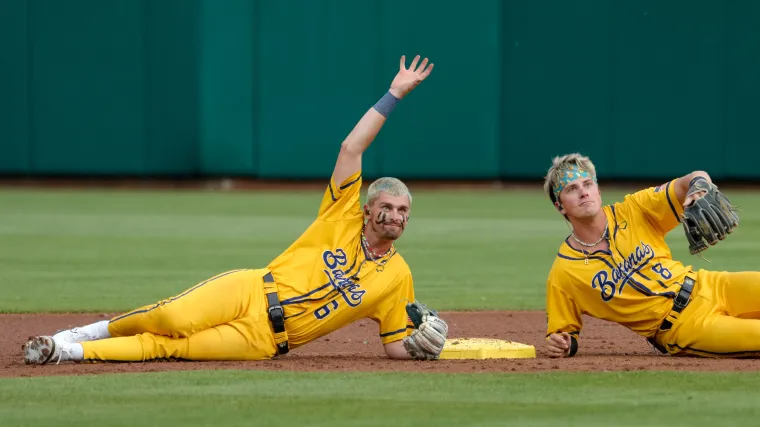There are multiple ways to entertain on a baseball diamond.
For standouts like Shohei Ohtani and Aaron Judge, their brilliance comes from their bats (among other things) — devices teeming with verve, color, and a litany of long balls. Paul Skenes and Tarik Skubal mystify batters with velocity and spin rate. There are also artisans like Pete Crow-Armstrong, Denzel Clarke, and Ceddanne Rafaela, blessed with impressive foot speed and the range to snag any unruly effort that dares to tumble into their direction.
Such an assessment translates to other forms of the sport, too. The minor leagues brim with potential, while the college game enchants us amid a flurry of metal bat clanks. Then there’s “Banana Ball,” the barnstorming baseball league based out of Savannah, Ga.
“Banana Ball” has become a fixture of scorched summers over the past few years, spearheaded by its most successful franchise, the Savannah Bananas. But just what does the exhibition consist of, and how does it differ from that of MLB’s iteration?
📲 Follow The Sporting News on WhatsApp
Here’s what you need to know.
What is ‘Banana Ball’?
“Banana Ball” refers to the edicts surrounding the Savannah Banana’s contests. They’re used to drum up fan interest and engagement.
There are 11 commandments in total, each of which aims to shake up the tried and true formula of baseball. They are as follows:
- Each inning is worth a point
- Two-hour time limit
- Batters can’t step out of box
- No bunting…ever
- Batters can steal first base
- No walks: if a pitcher throws four balls, the batter is tasked with sprinting while each defensive player (pitcher and catcher notwithstanding) is required to touch the ball before it becomes live. The batter is allowed to take as many bases as they so desire
- No mound visits
- Fans can make outs by catching foul balls
- Showdown tie-breaker: if a game is knotted after two hours, the matchup goes to a tiebreaker where each batter must score. If a batter scores, it’s worth one point. If they get out, it’s worth zero points and the game goes on. The tiebreaker consists of three rounds: the first involves the pitcher, catcher, hitter, and one fielder. The second sees the fielder vanish into the abyss — only the pitcher, catcher, and hitter count. The final round, meanwhile, involves pitcher, catcher, hitter, one fielder, and the peanut gallery — loaded bases. Each run counts as a point in these circumstances. If no team has claimed victory after three Showdowns, the match continues with the bases loaded until a winner is decided. A home run hit over the outfield fence automatically ends the game
- Challenges: coaches must throw/shoot a challenge prop before the next pitch to get umpires to examine a play. Fans are also allowed to get in on the action; a fan representative chosen pre-game is given one chance to challenge a call on the field. To do so, the fan in question has to fire off confetti and hold up a challenge sign to make their request legitimate;
- Golden batter rule: One time a game, teams can send any hitter in any spot in the lineup (e.g. sending your best hitter to the plate with the bases loaded regardless of what the batting order says).
Savannah Bananas scoring rules
The Bananas employ a rather curious scoring system, eschewing the typical run formula employed across various levels of baseball for a more number inning-to-inning approach. Allow us to explain:
Points vs. runs
In Bananas games, there are runs and points. Runs are still the currency that determines the winner of an individual inning, but they don’t dictate who wins a given matchup. That’s shaped by points.
Whoever scores more runs in a given inning receives a point. The first team to five points is declared the winner. If the game reaches its two-hour limit before one team scores five points, the team with the most points is crowned victor.
In many ways, the scoring system is similar to that of tennis or volleyball. Yes, runs matter, but they only matter in the context of winning innings.
How does a team win an inning?
Innings are where runs really come into play. The team who scores the most runs in a given inning claims “victory” over the inning. They receive a point for their efforts.
Other ‘Banana Ball’ differences compared to baseball
As previously mentioned, “Banana Ball” carries a fair few differences from the version of baseball we’ve all gotten used to. The sport is played at a faster pace and eliminates a series of decrees typically associated with America’s pastime, from bunting to walks and mound visits.
Fans can record outs if they snag foul balls, while batters are prohibited from leaving the box. Games have a hard stop time of two hours, and batters are required to sprint, not walk, if they see four balls during an at-bat.
Do the Savannah Bananas always win?
Contrary to popular belief, the Bananas don’t always vanquish their opponents. There is a script attached to each matchup, much like the Harlem Globetrotters. But those scripts don’t have any bearing on the result. According to Yahoo Sports, Savannah lost more than 20 games last season.






